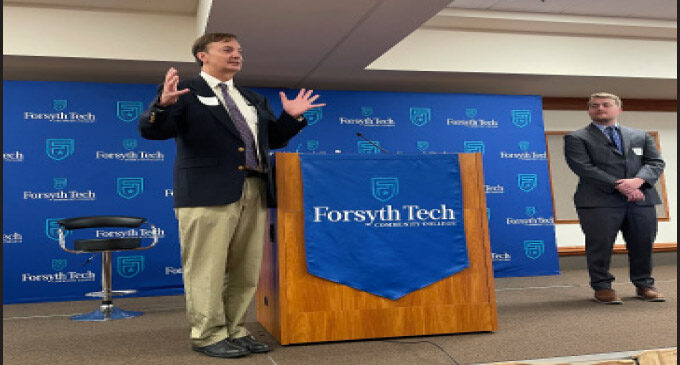CSEM rides to transportation solutions with Forsyth Tech
CSEM Director Craig Richardson, left, and CSEM Research Manager Zach Blizard at a recent transportation panel at Forsyth Technical Community College.

By John Railey
If you listened closely in a conference room at Forsyth Technical Community College recently, you could almost hear the sound of a logjam breaking. That logjam is the longstanding problem of public transportation, which touches on almost every issue of upward economic mobility, including education. Local elected officials have been slow to confront the issue.
But Forsyth Tech, through its cooperation in three years of research by Winston-Salem State University’s Center for the Study of Economic Mobility (CSEM), is starting to break the logjam. That was readily apparent at an Aug. 23 meeting Forsyth Tech held on its campus titled “Driving Forward.” CSEM Director Craig Richardson and CSEM Research Manager Zach Blizard presented their findings on transportation challenges faced by Forsyth Tech.
Richardson noted that the small city of Wilson, North Carolina, has a ridesharing program that is so successful it has replaced that city’s bus system. “We’re the City of Arts and Innovation,” he said. “Why aren’t we doing this?” He suggested a program to test ridesharing here, for those folks who struggle to get from one place to another via public transportation.
During a meeting break, Jeff Fansler, the deputy director of the City of Winston-Salem’s Transportation Department, told Richardson he’d like to see such a program and suggested that perhaps Forsyth Tech could do one. Richardson introduced Fansler to Dr. Stacy Waters-Bailey, the college’s associate vice president for academic strategy and partnerships, and Amy Ball Braswell, its director of strategic initiatives. The three energetically spoke about starting such a program.
It was a meeting full of enthusiasm, connectivity and brainstorming. In addition to CSEM, the presenters included Zachary Lang, the sustainability and transportation coordinator for the Green Trek Project at Wake Technical Community College, and Dr. Russell Castaneda Calleros, director of government and community relations at Rio Hondo Community College in Whittier, California, which has a GO Rio program. Green Trek incentivizes students to use economically friendly transportation options. Go Rio provides free bus passes and other options to students.
In a country dependent on cars that can cost $1,000 a month to operate, and where education costs continue to rise, such ideas are needed, especially in cities like Winston-Salem, where the public transportation system is sorely lacking. CSEM has helped lead public dialogue and action on confronting the issue through its 2017 documentary “Bus Stop Jobs” and through its path-breaking research.
According to Richardson and Blizard’s extensive research findings regarding Forsyth Tech and its students:
*Transportation has both a direct and indirect impact on students, prospective students and Forsyth Tech as an institution.
*Student experiences, especially for students relying on the buses and taxis, are negatively impacted. Students complete fewer credit hours, have lower GPAs and take longer to graduate, with all being exacerbated for students living farther away from campus
*The pair calculated, using stated assumptions, a loss of revenue between $405,156 and $633,688 in foregone tuition revenue from current students.
*They also calculated, by the same method, between $671,232 to $1,039,680 in foregone tuition revenue from prospective FTCC students.
*Around 57% of responding students stated that they would do more school-related activities, such as homework, studying, or attending a study group, with time saved from quicker commutes.
“A lack of transportation is hurting the bottom line here,” Richardson said. “If we have delays, that means we have interrupted tuition streams. Transportation matters. Distance matters. We also know that time matters.”
The transportation problems continue beyond the campus. “Even if I can get my degree, how am I going to get to my work?” Richardson asked.
He mentioned another facet of the problem. “There are so many people who would love to come here, but can’t because they don’t have a way to get here … the invisible students … What do we do?” Richardson asked. “How do we move from here?”
The Forsyth Tech meeting provided some good ideas. The college, with strong leadership from the school president, Dr. Janet Spriggs, has actively engaged with CSEM in transportation research. Bill Green, Forsyth Tech’s vice president for community engagement, is also committed to transportation research.
Conference participants agreed that cracking the logjam will require multiple efforts, including increased use of carpools, bikes, greenways and electric vehicles. Forsyth Tech, inspired by recommendations CSEM has made, is also studying changing some course schedules to coordinate with bus schedules. For Forsyth Tech graduates, Waters-Bailey and Braswell said, large companies might consider providing shuttle services for employees, as other cities are doing.
Forsyth Tech may also consider a test ridesharing program, transporting students from a satellite campus to the main campus.
Feaster, the transportation executive with the city, said, “I think that would be a good study for them to do and see how it works.” If the test program is successful, he said, the city might figure out a way to partner with the school to expand the program to others in the city.
Whatever happens, Forsyth Tech is committed to moving forward on transportation improvements.
“Within the next few weeks, we’ll be able to take what we’ve learned and move forward,” Ball Braswell said. “We don’t want to let the dust settle too much while the energy is still there.”
To see “Bus Stop Jobs,” go to Bus Stop Jobs (2018) – YouTube.
John Railey, the writer-in-residence for CSEM, can be reached at raileyjb@gmail.com.









